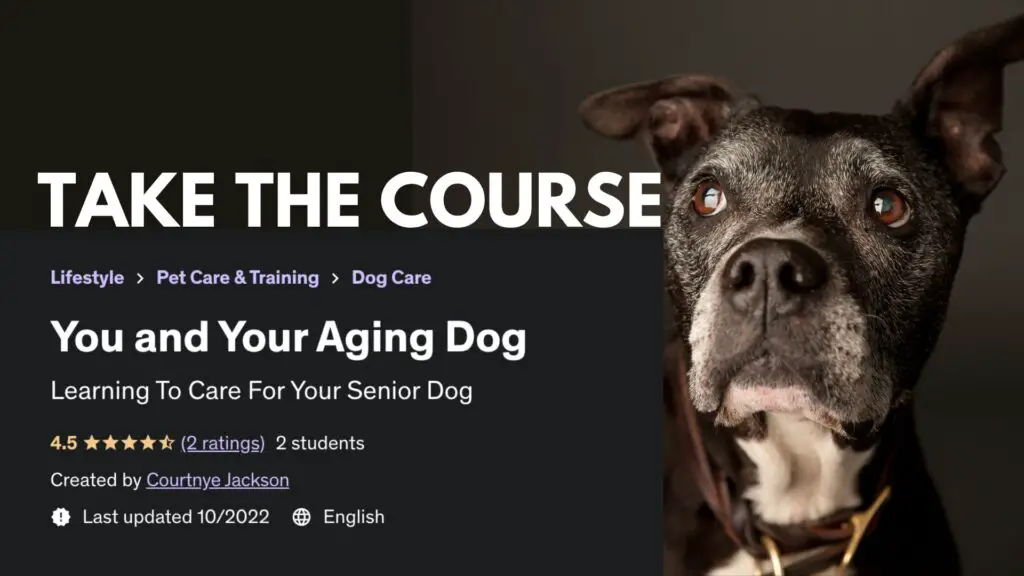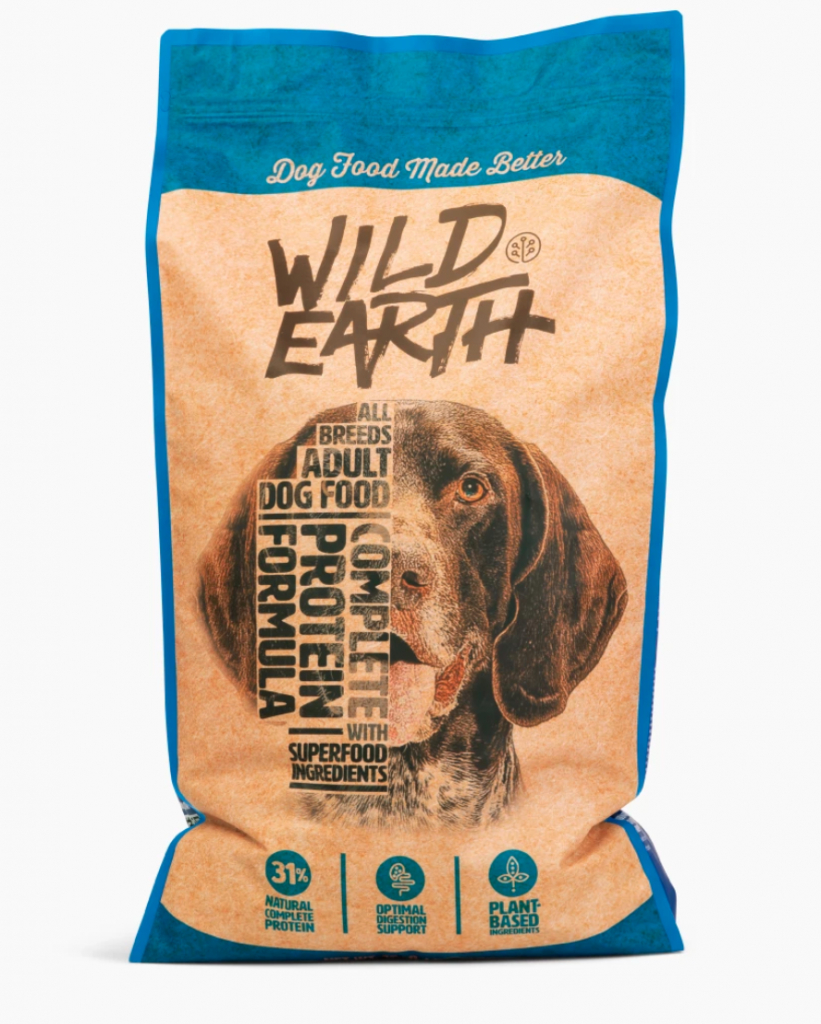As dogs age and head into their senior years, just like elderly people, there are dietary changes that can help their brains to function at optimal levels and keep cognitive dysfunction in your dog at bay. Your older dog’s diet drastically influences their behavior and cognitive function.

Senior and geriatric dogs may show some decline in cognitive abilities such as memory loss, disorientation, and sleep pattern disturbances.
Below we talk about what happens as your dog ages and some foods that can hinder them from aging optimally and some that can enhance their cognition.

What happens in your dog’s brain as s/he ages?
Aging can result in a number of negative effects on the brain but doesn’t necessarily have to. Age-associated brain changes can be due to a number of issues:
- Gray and white matter atrophy
- Accumulation of abnormal proteins (like in Alzheimer’s patients)
- Reduced glucose metabolism
- Inflammation
- Oxidative Stress
- Mitochondrial dysfunction
- Vascular changes
- Myelin reduction
- Reduced neurogenesis (creation of neurons)
These things often result in issues like cognitive decline, decreased memory, and canine cognitive dysfunction syndrome. Some people call cognitive dysfunction syndrome in dogs ‘dog dementia’.
- Changes in Personality: you may notice your dog becoming more aggressive with you, your family members, or other pets. Your dog may be increasingly anxious or fearful
- Disorientation: Your dog may run into things like walls or get stuck behind a piece of furniture (this can also be due to blindness from common age-related issues like cataracts)
- Staring: You may notice your dog staring at a wall or other focal point
- Decreased Recognition: Your dog may no longer recognize you or other family members
- Changes in sleep cycle: You may notice that your dog wakes often during the night and roams the house
- Soiling: Your dog may begin to soil their environment or seem to regress in the housetraining
- Changes in Activity: Your dog may begin to slow down and not be as active as they once were (although this can generally come with old age in some dogs)
- Pacing: You may notice your dog pacing
Determining if your dog has cognitive dysfunction syndrome or dog dementia
See your vet who will most likely run some tests like blood work and possibly an x-ray to determine if there could be any other reason for the changes in behavior like hyperadrenocorticism. Once these things have been ruled out your doctor can give you an official diagnosis.
How do I know when my dog is a senior?
Do you remember the adage that says for every year a human lives their dog has aged seven? Well, that old way of determining your pup’s age by relating dog years to human years is outdated. This way of calculating a dog’s age has been around since the 1950s and has gone out the window.
Smaller dogs tend to live longer than large dogs with an average life span of 14 years and larger breeds seven (source). Hence, larger breeds are considered seniors at around 5 or 6 years of age, and smaller dogs at around 10. This comes into play when trying to determine if your dog is truly a senior or not.
The chart below from the AVMA shows an estimate of human years to dog and cat years. The AKC also has a great chart you can use to determine your dog’s years when comparing them to human age.
If you are truly unsure of your dog’s age, your vet can look at his or her teeth and give you a guesstimate of their age. Of course, age is really nothing but a number in some cases as the oldest dog on record was Bluey, a 29-year-old Australian cattle dog.
Eliminate Brain-detrimental ingredients from your dog’s food

Studies have shown that there are many beneficial effects that feeding your old dog a brain-healthy diet which can have on your dog’s cognitive function, including slowing the progression of cognitive dysfunction. However, along with adding some things to your dog’s diet, there may be ingredients you want to avoid or remove.
These items should be eliminated or decreased in dogs at any stage of life, but as your dog ages you want to make sure these are nowhere near their food bowls
Gluten
Just like in humans, dogs can have gluten sensitivities which have been linked to impaired brain function in people. The issues seen in people include memory problems and learning liabilities.
High-glycemic carbohydrates
Colleen Paige the author of The good behavior book for dogs states that high-GI foods like corn and wheat create similar sugar highs in dogs as they do in people that eat them. Dogs may be full of energy one minute and crash the next.
Too much sugar can lead to neurological issues such as canine cognitive dysfunction syndrome or CDS also known as canine cognitive dysfunction, which is similar to Alzheimer’s disease in people.
High-glycemic foods fed in excess can lead to diabetes which also negatively affects the brain and will also leave your dog feeling hungry soon after they have eaten. (Boler 2011/Pagie 2007)
Free Radicals
The oxidation of cells by free radicals has been identified as a major cause of aging. While you may not be able to eliminate free radicals you can definitely attempt to counteract them by feeding your dog a diet rich in antioxidants. Younger pups can protect themselves well from the detrimental effects of free radicals as your dog ages they become increasingly vulnerable to oxidation.
To help counteract free radicals, feed your dog a diet rich in antioxidants. In one study dogs were fed an diet rich in antioxidants for six months and showed considerable improvement in cognitive function. (Cotman et al 2002)
In the study the dogs were fed the following:
- Vitamin E
- Vitamin C
- acetyl-l-carnitine (which improves mitochondrial function)
- lipoic acid
- Fruits – like citrus pulp
- Vegetables – like spinach flakes and carrot granules
Fillers
Fillers are unhealthy ingredients included in many pet foods to make your dog feel full or satiated. These hold little to no nutritional value and can lead to obesity and high blood sugar which as we learned above is extremely bad for your dog’s cognitive function.
When most people think of fillers, they think of corn, wheat, soy, and rice but these can actually hold some nutritional value for dogs, but you want them to be further down on the ingredient list. But definitely eliminate things like corn syrup, and MSG (monosodium glutamate). (Source)
Four ways to eliminate unwanted products in your dog’s food

1. Read Your Labels
Always read your dogs food labels to ensure that sugar, corn, or fillers are not one of the first ingredients
2. Make your meals at home
While not feasible for all since it does take quite a bit of time and effort as you have to know exactly what nutrients your dog needs since there is always the possibility you could do more harm than good if not. Another option, if you want homemade meals for your dog is to order from a subscription company. Here are a few that we like.
3. Choose Good Ingredients
Choose a food that is made from organic whole ingredients
4. Feed for Seniors
Choose a diet made for senior or aging dogs which include things like antioxidants, Omega 3’s, and other brain-boosting foods
Brain-boosting ingredients for your dog’s food
There have been many studies that investigated the effect of functional foods on dogs’ cognitive abilities. Many of the studies showed an improvement in cognitive function, overall attitude, and other health issues.
1. Apoaequorin
Apoaequorin is a calcium-binding protein derived from jellyfish and studies show that it holds some benefit when given to senior or geriatric dogs struggling with cognitive decline by enhancing memory.
While still being heavily researched its mode of action is believed to improve neurodegeneration and neuron death by improving intracellular calcium dysregulation.
Humans that have signs of cognitive decline show significant improvement when taking Apoaequorrin and in a study with geriatric beagles, this also held true. The beagles were given Apoaequorin and exhibited improved cognitive abilities.
2. Antioxidants

Oxidative stress increases aging in both pets and humans there have been several studies showing how antioxidants help decrease the cognitive decline in dogs and issues like canine cognitive dysfunction syndrome.
Antioxidative enzymes and nutrients like vitamins E and C bind to, capture, or prevent the formation of free radicals and therefore decreasing oxidative stress. While the body produces many of these as dogs age endogenous antioxidant capacity decreases making the mitochondrial function in the brain less efficient. (Source)
- Vitamin E
- Vitamin C
3. Mitochondrial cofactors
Mitochondrial cofactors are chemicals that play a part in mitochondrial function and antioxidation when given in combination to dogs there is a tremendous improvement in cognitive function.
L-carnitine functions as an antioxidant and when given in combination with other supplements can help improve cognition in dogs. (acetyl-l-carnitine is its metabolite)
a-lipoic acid
4. SAM-e
S-adenosylmethionine is a chemical that assists in neurotransmitter turnover and has some antioxidant effects which is why it is a great supplement for aging dogs.
Reduced amounts of SAM-e have been associated with aging and other neurologic disorders in humans like Alzheimer’s so researchers assume supplementing should help to counteract these processes.
There have been some studies about how well SAM-e improves cognition in humans, the scientific community continues to seek further information about how cognitively supportive it is for pets. One preliminary study showed cognitive improvement in dogs’ executive function but not memory these were also not senior pets.
In another study dogs with cognitive decline showed improvement when given SAM-e
SAM-e is also included in many veterinarians’ health plans when treating a dog that has liver disease.
5. Omega 3 Fatty Acids

Omega 3 Fatty Acids have long been touted as having anti-inflammatory effects on the brain but it is also neuroprotective in dogs. It has also been shown to be safe for use in dog
Omega 3s also help improve skin and have been shown to help with arthritis
6. Coconut Oil

Coconut oil, specifically the MCTs found in the oil, have been shown to increase cognitive abilities in dogs with long-term supplementation. MCT oil when given to dogs generates ketones that can be used as an energy source by brain cells which can help prevent age-related declines in neural function.
Glucose is the main source of energy for neurons but glucose metabolism is usually reduced with age and other energy sources like ketone bodies may be needed to maintain neuronal metabolism.
This isn’t due to the same type of ketosis that is induced by feeding a ketogenic diet as it has been shown that dogs do not respond in a similar way to humans.
The use of MCT oil in dogs does not negatively impact blood pH and has no known adverse effects and changes in the gastrointestinal microbiota may also have something to do with the beneficial effects.
Other benefits of MCT oil
- MCTs can help with your dog’s weight loss as they increase they may help your dog feel fuller faster, they also aren’t stored as fat
- MCTs help improve digestion and absorption of fat-soluble vitamins
- MCTs have also been shown to improve the skin and coat of dogs
Selecting a coconut oil for your dog
Choose one that is unrefined
- Expeller pressed or cold pressed meaning that it hasn’t been heated or processed and lost nutrients in the process
- Choose an organic coconut oil when possible to eliminate the chances of giving your dog potential toxins like pesticide
- Choose an oil that is in a dark-colored jar because as with most oils, light can cause it to go rancid also store it in a dark cool place
- Buy coconut oil that is in a glass jar to prevent the chances of BPA leeching into the oil
Coconut oils are great to use in frozen treats in the summer for a recipe click here
7. Milk Thistle

According to VCA, milk thistle, specifically, silibinin which is extracted from the seed, is safe and well-tolerated for animals and many veterinary herbalists or holistic practitioners recommend the use of the herb in dogs for many years to treat liver disorders.
It works as an antioxidant as many of the other herbs discussed and it is also commonly given to dogs with cancer as part of their treatment.
Silibinin has been shown to assist in recognition memory in mice and further studies are looking at the effects in dogs.
One caution is that milk thistle should not be used in pregnant animal
8. Blueberries

Yes, dogs can have berries and they are quite beneficial for your pup. Blueberries are one of the most beneficial as they are extremely rich in the phytochemical compound anthocyanin which is an excellent source of antioxidants. If your dog is averse to blueberries, you can try placing them in homemade treats.
Here is a list of some other fruits that are quite beneficial for your pup
The best commercial dog food for senior dogs
So now that you know some of the ingredients which may benefit your aging dog you probably want to know which foods already have these ingredients in them right?
The Farmers Dog has great dog food for seniors. Wild Earth is another great option.
1. Wild Earth
2. Wellness Core
Other things you can do for your aging dog
While food is extremely important, there are some other things you should be doing to help increase your dog’s chances of aging gracefully and without cognitive issues or at least minimal cognitive abnormalities.
1. Physical Stimulation
Just like with humans, pets need physical exercise into their senior years, this not only helps to keep their bodies healthy but also their brains.
There are a variety of things you can do with your pet from walking, jogging, or mini obstacle course that can be easily created.
Keep in mind that you should include new and stimulating experiences for your pup as well because according to Dr. Stanley Coren, “The brains of animals that have lived in changing and complex environments actually become larger. New connections develop between existing neurons in the cortex as a result of experience. Recent evidence demonstrates that it is even possible to grow new neural cells in important areas of the brain that are associated with learning, memory, and the organization of behavior.” (Source 1 / Source 2)
2. Mental Stimulation
Brain games are effective for keeping brains healthy regardless of species or age. There are tons of mentally stimulating games you can get for your pup online or you can create some at home.
Can a ketogenic diet help my senior dog?
There have been some connections to neuroprotection and feeding a ketogenic diet in both humans and dogs, specifically those suffering from epilepsy and Alzheimers. However, further studies are necessary to determine if there is a beneficial link between dogs with cognitive dysfunction syndrome and a ketogenic diet. If you want to learn more about feeding your dog a ketogenic diet read our article: Dogs & Ketosis: Should you feed your dog a keto diet?
Conclusion
In conclusion, there are many nutritional supplements that may help decrease or reverse cognitive decline in your pup including antioxidants, coconut oil, and blueberries. However, to gain the most benefit from these ingredients you will want to give them in combination as studies show that giving vitamin E, vitamin C, fish oil, mitochondrial cofactors α-lipoic acid, and L-carnitine, along with healthy fruits and vegetables have the most beneficial effect on dogs cognition. There are several over-the-counter supplements available for senior dogs that are packed with these foods, herbs, and chemicals so that you don’t have to do the mixing!
References




























































































































